Health Insurance
Nearly Half of Americans are Struggling With Loneliness Amid Social Distancing, and Many Don't Know Where to Find Help
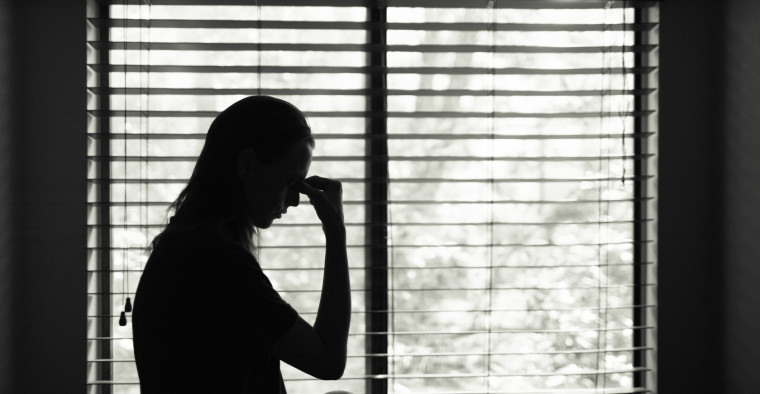
Loneliness is a feeling of sadness and unhappiness about being socially isolated. According to the Mayo Clinic, loneliness can be a serious health concern with long-term issues associated with depression and anxiety.
How are people across the U.S. coping with stay-at-home orders and social distancing? ValuePenguin's survey, which aimed to understand how Americans are adapting to these conditions, found that many are struggling. Nearly half of Americans are dealing with loneliness amid social distancing, and many are feeling more anxiety.
Key findings:
- 55% of respondents said their mental health is suffering because of the coronavirus outbreak, especially millennials (63%) and parents with young children (64%).
- 47% of Americans said they're feeling more lonely than usual because of the coronavirus pandemic and the isolation it's caused.
- Women, those who live alone, singles and childless Americans cited higher instances of loneliness compared to their peers.
- Only half of Americans said they speak to loved ones daily. Ten percent said virtual video chats and phone calls exacerbate their feelings of loneliness.
- More than 20% want to try virtual therapy but haven't due to concerns over insurance coverage. That's especially true for Gen Zers (31%) and millennials (23%).
- 59% don't know where to find free mental health resources they can access from home.
Mental health of Americans
More than half (55%) of individuals said their mental health is suffering because of the coronavirus outbreak. More women than men — 56% versus 54%, respectively— said the coronavirus has taken a toll on their mental health. Only about a fifth (18%) of respondents said their mental health state has not changed at all.
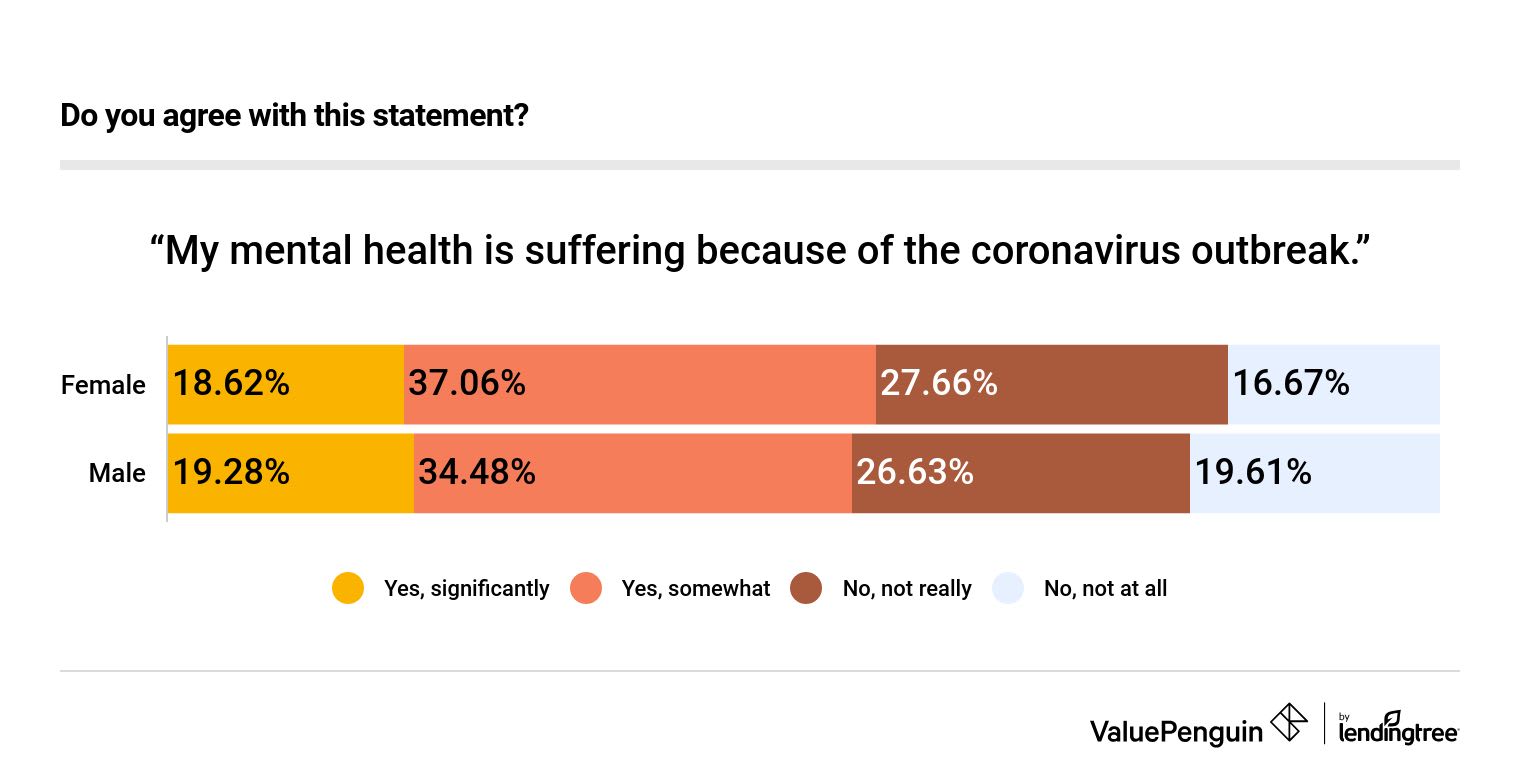
While millennials (63%) and Gen Xers (59%) reported worsened mental states, 66% of the silent generation said their mental states have been affected very little or not at all due to COVID-19.
Aspects of the coronavirus that have negatively affected mental health
Nearly 1 in 6 respondents said the coronavirus has increased their anxiety, with widespread uncertainty being a major factor. Specifically, women (69%) have felt far more anxious compared to their male (48%) counterparts.
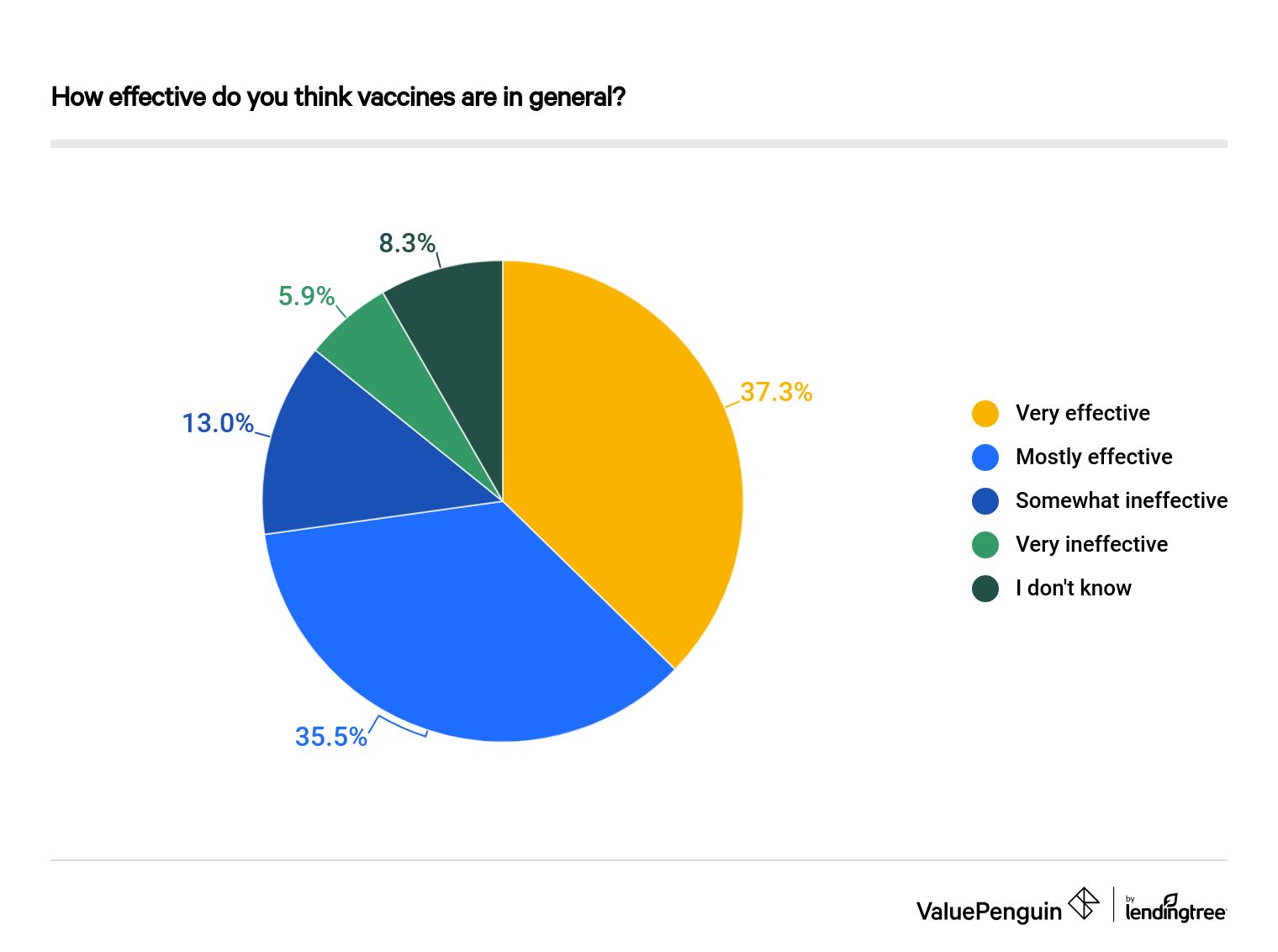
Employment status is another major factor. Of those who said their mental health has been negatively affected, a fifth reported an increase in work-related stress. More than half (52%) are now worried about a potential loss of income, and amongst those who have been laid off or furloughed, 71% said they're worried about their loss of steady income.
Americans feeling a range of strong emotions
Unsurprisingly, the coronavirus pandemic has put Americans on a rollercoaster of emotions. Our survey found that over the course of the previous month, more than half had experienced anxiety, and more than a third felt scared, lonely, and exhausted.
Staying at home has forced Americans to reduce or even eliminate social interaction, meaning less connection with other individuals and even loved ones. Isolation and uncertainty have led to a variety of emotions.
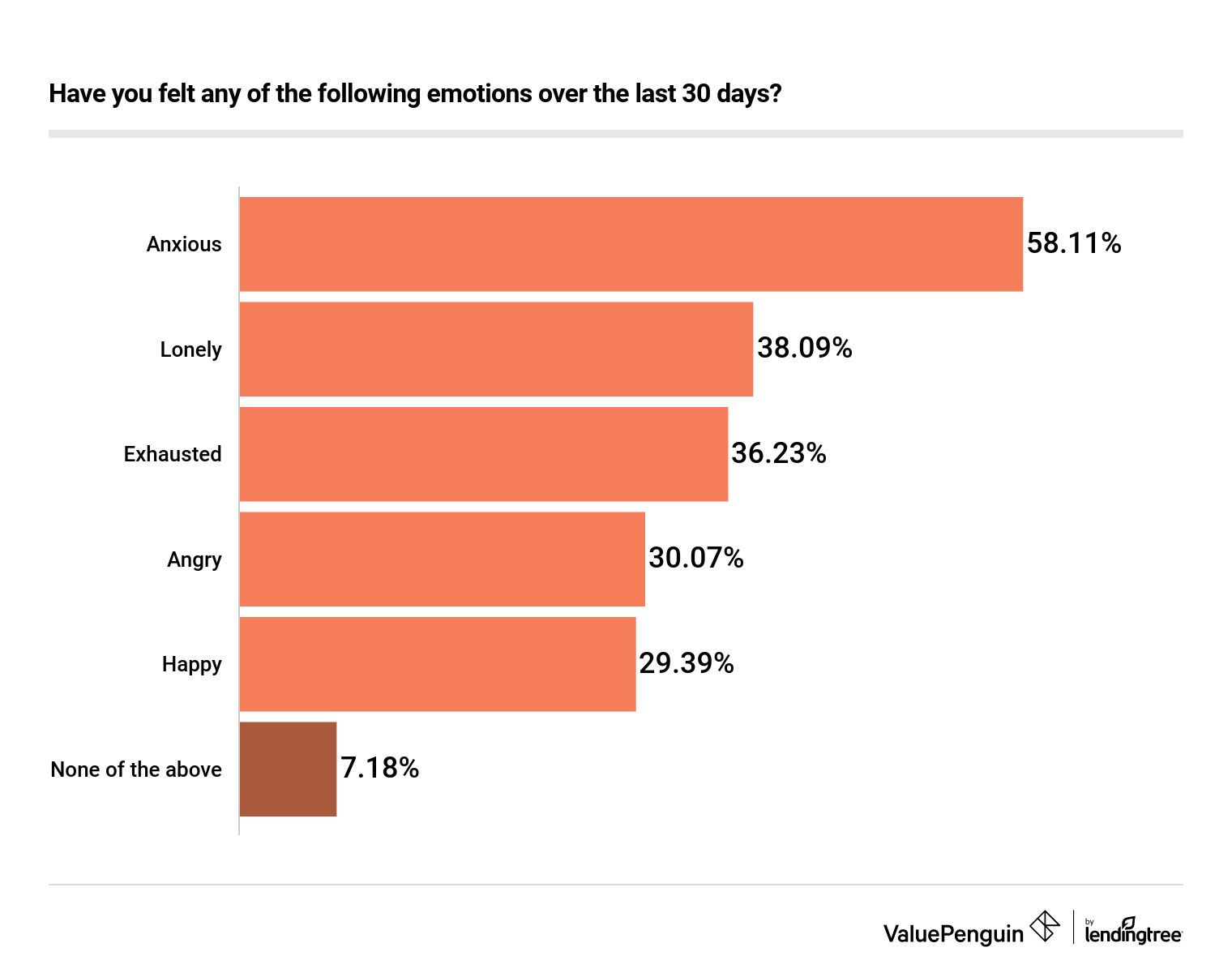
In our survey, close to 93% of respondents said they had experienced an increase in one or more emotions over the prior 30 days. It's worth noting, however, that over a quarter of Americans still feel happy, and 26% reported that they have a relaxed outlook.
Who is most at risk for loneliness?
When asked if they felt more or less lonely since the beginning of the pandemic, respondents in Gen X (49%), millennials (48%) and Gen Zers (46%) were most likely to report feeling increased loneliness. People in the silent generation overwhelmingly responded they have not felt any more lonely during this self isolation period — 62% responded that they feel "the same."
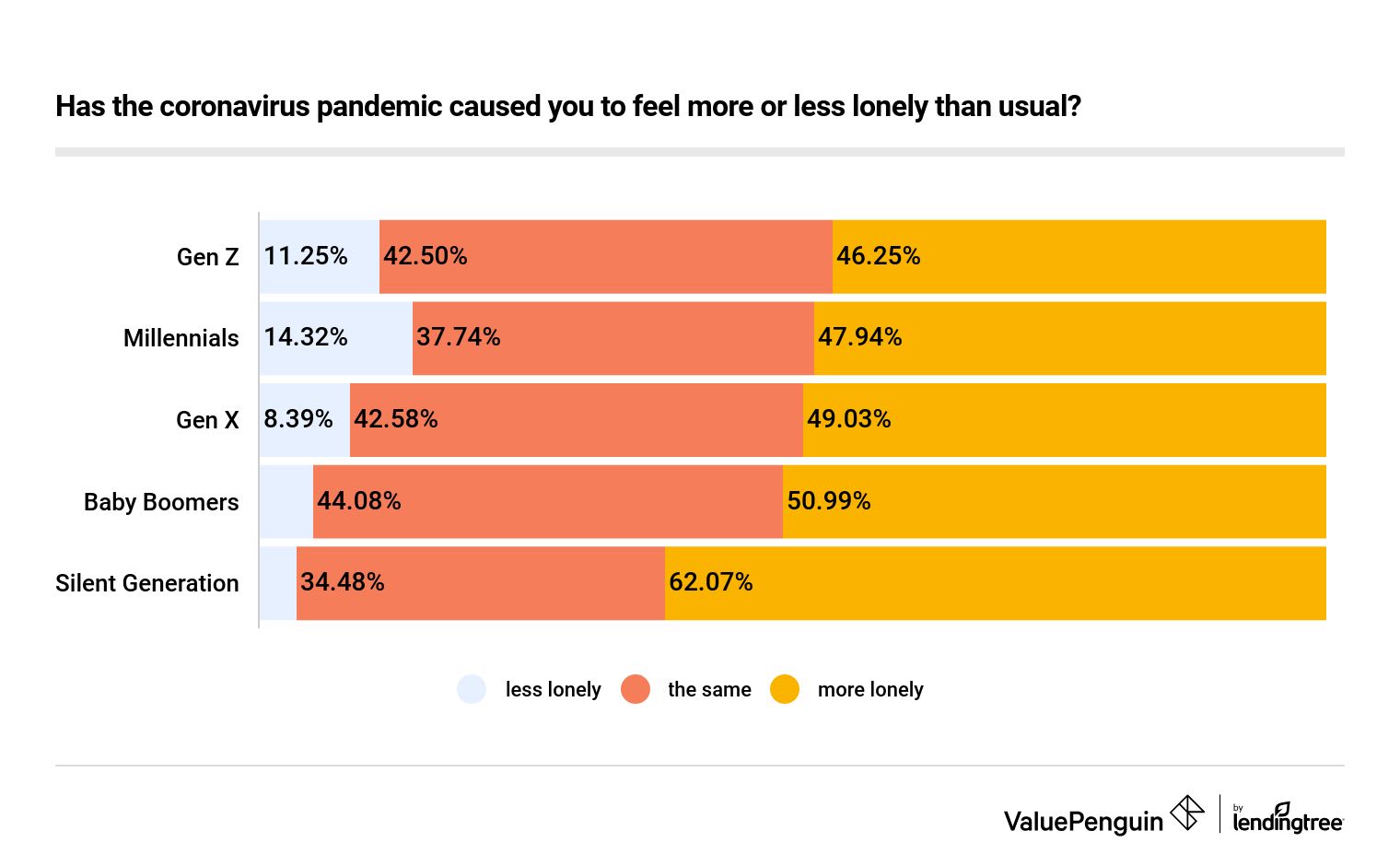
Those who live alone are especially vulnerable, with 51% reporting that they suffer from feelings of loneliness versus 35% of those who live with others. And just a third of married respondents feel lonely, versus 43% of those who are single. Respondents who don't have children also report feeling more lonely than those who do have children.
Social distancing has created distance between family and friends
During these times of isolation, only half of Americans said they speak to loved ones on a daily basis. But for the most part, video chatting and phone calls have helped rather than hurt.
As many as 42% of respondents said that virtual visits made them feel less lonely, while a tenth of respondents said it made their loneliness worse. Specifically, Gen Z, millennials and Gen X were the age groups most likely to respond that they felt more lonely after a video conference — 15%, 13% and 11%, respectively.
Individuals don't know where to find help, but some turn to virtual therapy
Nearly 1 in 6 respondents said they don't know where to find free mental health resources that can be accessed from home. This number is significantly higher amongst older generations, including baby boomers (62%) and the silent generation (90%).
More than 20% of respondents say they want to try out a virtual therapist, but haven't yet, due to concerns about whether it's covered by their insurance. That's especially true for Gen Zers (31%) and millennials (23%), who are the most interested in doing virtual therapy.
When asked about their insurance provider, only 38% said their insurance offered mental health resources or services beyond virtual therapy. About 25% weren't sure and 19% said it was not offered.
Mental health and loneliness resources
In reality, most insurance providers do offer a variety of mental health resources. For example, many large insurers — including UnitedHealthcare, Aetna and Cigna — are now increasing their virtual-visit capacity or other mental health coverage.
If you need further help dealing with a mental health challenge, we recommend contacting the Substance Abuse and Mental Health Services Administration. Their national help hotline is free, available 24/7 and does not require health insurance.
Methodology
ValuePenguin commissioned Qualtrics to conduct an online survey of 1,184 Americans, with the sample base proportioned to represent the overall population. The survey was fielded April 14–16, 2020.
